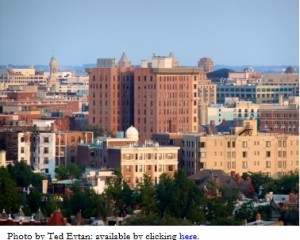The DC Council will take an important vote today to use DC-owned land to create affordable housing throughout the District’provided the Council doesn’t approve amendments that weaken the bill. One of the possible amendments could potentially remove affordable housing in one-quarter of the city’s land dispositions.
The Disposition of District Land for Affordable Housing Act would allow DC’s public land to be sold below market value and in return require developers to make a portion of the new housing there affordable. This smart approach pairs private and public resources, creates mixed-income communities, and helps low-income residents live in developing areas with better job, school, and retail opportunities. 
The bill would use public land value to generate mixed-income communities with a substantial amount of affordable housing. It would require 30 percent of new housing built near public transportation to be affordable. Elsewhere, 20 percent of the units would need to be affordable.
For rental properties, a quarter of the affordable units would be for people with incomes under $29,000 for a family of three (30 percent of AMI), and the rest would be for residents making up to $48,300 for a family of three (50 percent of AMI) For homeowner properties, the affordable units would be split between residents earning under $48,300 and those earning under $78,200 for a family of three (80 percent of AMI).
Yet, three potential amendments could significantly weaken the bill and should be opposed:
#1: Oppose raising the threshold of when the bill would apply. The bill applies when 10 or more residential units will be built, but one amendment could exempt all developments up to 80 units. This could eliminate affordable housing in many projects, especially in areas of the city where larger developments are not likely to occur.
DC land dispositions in recent years resulted in anywhere from 9 units to 1,200. But nearly one-quarter of the land dispositions resulted in fewer than 20 units. Exempting these buildings would eliminate many opportunities to get affordable housing in DC neighborhoods.”‹
#2: Oppose limiting the CFO’s independent role to guarantee affordable housing. The bill allows the affordable housing set-aside to be reduced when land value is not enough to cover the cost. But it relies on the CFO to provide an independent, expert analysis in these cases that the scaled-back requirements maximize the affordable housing that can be leveraged — and that the goal of the bill is fully met. An amendment to make the CFO analysis purely advisory would be no way to ensure that affordable housing is maximized, because a non-binding CFO analysis could be ignored under pressure to get a deal done.
# 3: Oppose allowing affordable housing units to disappear over time. Another amendment could allow the mayor to waive the requirement that units be affordable for the life of the building. In DC and across the country, communities struggle to replace affordable housing when requirements end before the end of a building’s useful life. The bill recognizes D.C. land as a public asset that should be used to create housing that is affordable for as long as possible.
Another amendment to the bill represents a reasonable compromise and should be supported:
Allowing the land value to be apportioned between affordable housing and a government facility. In some instances, DC may want to dispose of land to build both housing and a new government facility such as a library, recreation center, or police or fire station. It is reasonable to allow the land value to be apportioned based on square footage so that it can subsidize both the affordable housing and the library or fire station.
The District’s publicly owned land presents a unique opportunity to use the rapid growth in property values to create a greater number of affordable units. By offering land at a discount, the District can create affordable housing units without using tax dollars. In return, low-income residents get to live in mixed-income areas that have greater economic opportunities such as access to job centers, higher-quality schools, and greater public amenities.
That is why the DC Council should vote support this bill but vote no to the proposed amendments that would significantly weaken its ability to create low-cost housing across DC.
To print a copy of today’s blog, click here.
